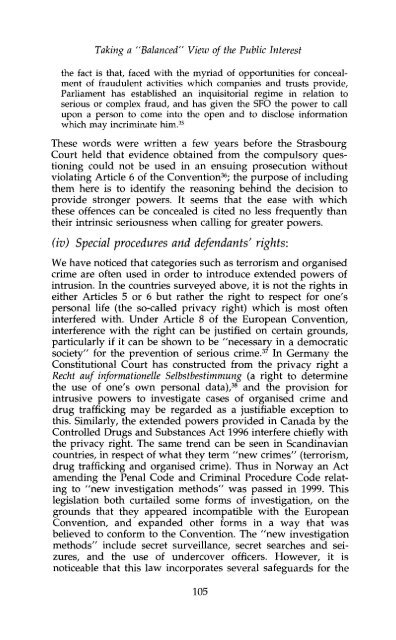Human Rights, Serious Crime and Criminal Procedure - College of ...
Human Rights, Serious Crime and Criminal Procedure - College of ...
Human Rights, Serious Crime and Criminal Procedure - College of ...
- No tags were found...
Create successful ePaper yourself
Turn your PDF publications into a flip-book with our unique Google optimized e-Paper software.
Taking a "Balanced" View <strong>of</strong> the Public Interestthe fact is that, faced with the myriad <strong>of</strong> opportunities for concealment<strong>of</strong> fraudulent activities which companies <strong>and</strong> trusts provide,Parliament has established an inquisitorial regime in relation toserious or complex fraud, <strong>and</strong> has given the SFO the power to callupon a person to come into the open <strong>and</strong> to disclose informationwhich may incriminate him. 35These words were written a few years before the StrasbourgCourt held that evidence obtained from the compulsory questioningcould not be used in an ensuing prosecution withoutviolating Article 6 <strong>of</strong> the Convention 36 ; the purpose <strong>of</strong> includingthem here is to identify the reasoning behind the decision toprovide stronger powers. It seems that the ease with whichthese <strong>of</strong>fences can be concealed is cited no less frequently thantheir intrinsic seriousness when calling for greater powers.(iv) Special procedures arid defendants' rights:We have noticed that categories such as terrorism <strong>and</strong> organisedcrime are <strong>of</strong>ten used in order to introduce extended powers <strong>of</strong>intrusion. In the countries surveyed above, it is not the rights ineither Articles 5 or 6 but rather the right to respect for one'spersonal life (the so-called privacy right) which is most <strong>of</strong>teninterfered with. Under Article 8 <strong>of</strong> the European Convention,interference with the right can be justified on certain grounds,particularly if it can be shown to be "necessary in a democraticsociety" for the prevention <strong>of</strong> serious crime. 37 In Germany theConstitutional Court has constructed from the privacy right aRecht auf informationelle Selbstbestimmung (a right to determinethe use <strong>of</strong> one's own personal data), 38 <strong>and</strong> the provision forintrusive powers to investigate cases <strong>of</strong> organised crime <strong>and</strong>drug trafficking may be regarded as a justifiable exception tothis. Similarly, the extended powers provided in Canada by theControlled Drugs <strong>and</strong> Substances Act 1996 interfere chiefly withthe privacy right. The same trend can be seen in Sc<strong>and</strong>inaviancountries, in respect <strong>of</strong> what they term "new crimes" (terrorism,drug trafficking <strong>and</strong> organised crime). Thus in Norway an Actamending the Penal Code <strong>and</strong> <strong>Criminal</strong> <strong>Procedure</strong> Code relatingto "new investigation methods" was passed in 1999. Thislegislation both curtailed some forms <strong>of</strong> investigation, on thegrounds that they appeared incompatible with the EuropeanConvention, <strong>and</strong> exp<strong>and</strong>ed other forms in a way that wasbelieved to conform to the Convention. The "new investigationmethods" include secret surveillance, secret searches <strong>and</strong> seizures,<strong>and</strong> the use <strong>of</strong> undercover <strong>of</strong>ficers. However, it isnoticeable that this law incorporates several safeguards for the105
















